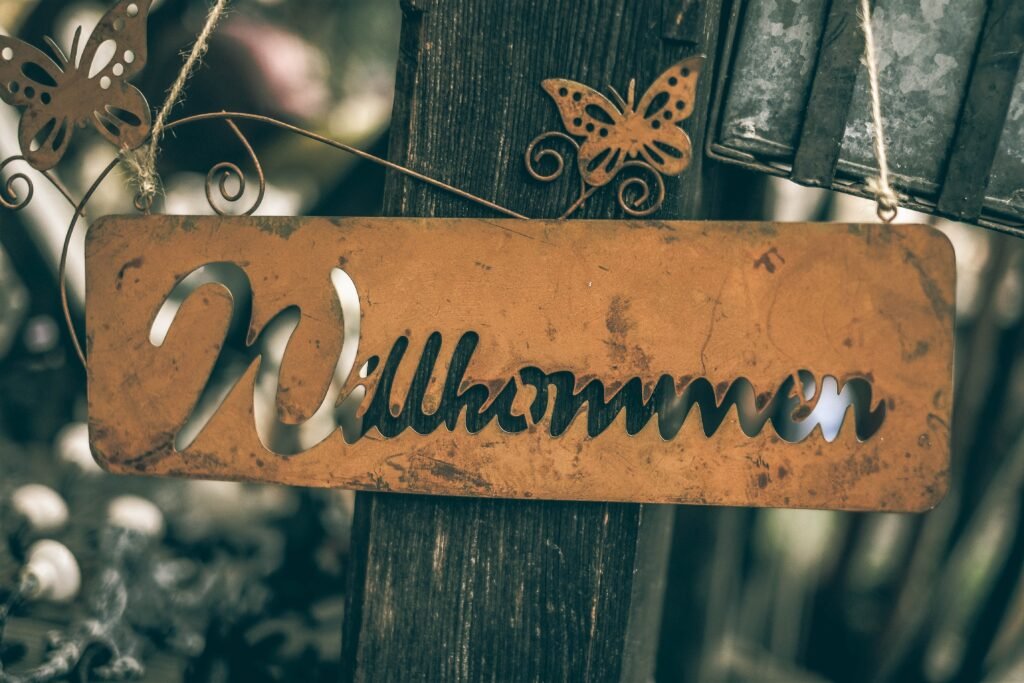Learn German A1: Cafes & Bars & Restaurants Lesson 42. In Germany, cafes are abundant in nearly every town, often filled with people enjoying “Kaffee und Kuchen” and a good chat also known as “Kaffeeklatsch“.
der Kaffeeklatsch: an informal gathering over coffee to chat or gossip.
Germans call their afternoon coffee-and-cake sessions a “Kaffeeklatsch” (coffee gossip).
After coffee arrived in Germany in 1675, “Kaffeehäuser” quickly appeared in cities like Hamburg, Bremen and Hanover, initially as a luxury reserved for the nobility.
Germans love gathering for Kaffee und Kuchen (coffee and cake) in the afternoon.
The German language is very open to integrating words from other languages. Here are some examples:
- die Bar (the bar)
- das Café (the café)
- die Disco (the disco)
- der Job (the job)
- das Restaurant (the restaurant)
In Germany, you might spot headlines about cafes transforming from “Oma-Cafés” to “Hipster Cafés,” evolving from old-fashioned, grandmotherly places to trendy spots for an alternative crowd.
Learn German A1: Describe Personalities in German Lesson 32
Table of Contents
Es gibt – There is
It is used to discuss whether cafes or restaurants exist at particular places.
“Kaffee” and “Café” are pronounced the same.
“Der Kaffee” is the drink (coffee). / “Das Café” is the place (café).
“Es gibt viele” means “there are many“.
1): Es gibt viele Restaurants und Bars. – There are many restaurants and bars.
2): Es gibt viele Bars in Berlin. – (There are many bars in Berlin.)
3): Es gibt viele Restaurants, Bars, Cafés und Discos. – There are many restaurants, bars, cafés and discos.
4): Es gibt viele Restaurants und Cafés. – There are many restaurants and cafés.
5): Es gibt viele Discos in Berlin. – There are many discos in Berlin.
While, “Es gibt wenige” means “there are few“.
For Example:
1): Es gibt wenige Jobs. – There are few jobs.
2): Es gibt wenige Bars in Augsburg. – (There are few bars in Augsburg.)
Make suggestions
To order, say “Ich möchte… + trinken” (basic form of “to drink” at the end).
Ich möchte Kuchen essen. – I would like to eat cake.
Möchtest du auch Kaffee trinken? – Would you also like to drink coffee?
Ich möchte Kaffee trinken. – I would like to drink coffee.
“Möchtest du auch…?” is a polite way to suggest or propose something to someone.
Möchtest du auch Wein trinken? – Would you also like to drink wine?
Ja, Ich möchte auch Wein trinken. – Yes, I would like to drink wine.
Möchtest du in ein Café gehen? – Would you like to go to a cafe?
Describe using ”gehen”
Ich gehe gern in Cafés. – I like going to cafes.
Ich gehe gern in Restaurants. – I like going to restaurants.
Gehst du gern in Clubs? – Do you like going to clubs?
Ja, Ich gehe gern in Clubs. – Yes, I like going to clubs.
Gehst du gern in Bars? – Do you like going to bars?
Nein, Ich gehe nicht gern in Bars. – No, I do not like to go to the Bars.
Describe Cafes, Bars etc
1): Die Bar ist sehr gut. / Die Bars sind sehr gut.
2): Das Café ist sehr gut. / Die Cafés sind sehr gut.
3): Die Restaurants, die Bars und die Cafés in Berlin sind schön.
4): Die Restaurants sind gut. – The restaurants are good.
5): Die Cafés in Berlin sind super. – The cafes in Berlin are great.
6): Die Discos in Berlin sind super. – The discos in Berlin are great.
We can ask questions as follows:
In welches Café gehen wir? – Which cafe should we go to?
7): Das Café am Bahnhof ist teuer. – The coffee shop at the train station is expensive.
The opposite of “teuer” (expensive) is “günstig” (well-priced).
Die Cafés in Kreuzberg sind günstig. – The cafes in Kreuzberg are good value.
“billig” means low in price and quality, whereas “günstig” is good in price and quality.
8): Das Café Victoria ist günstig. – Café Victoria is good value. (This cafe has high quality food and drinks for a good price.)
9): Das Café hier ist günstig, aber das da ist teuer. – This cafe here is good value, but that one there is expensive.
10): Das Blumencafé ist klein. – The Blumencafé is small.
11): Das Cafe an der Uni ist groß. – The university cafe is big.
12): Das Café am Altmarkt ist teuer und altmodisch. – The cafe on Altmarkt is expensive and old-fashioned.
“altmodisch” means something is no longer in line with today’s fashion or taste.
Ask someone to join you
Gehst du gern in Clubs? – Do you like to go to the clubs?
Nein, ich gehe lieber in Bars. – No, I prefer going to bars.
Gehen wir in ein Café! – Let’s go to a cafe!
When talking to friends use “Gehen wir…!” to make a suggestion. This is quite direct, but Germans won’t feel offended at all.
Learn German A1: Describe Job Tasks Lesson 35
Short Dialogue
Hallo Mari!
Wie geht’s dir? Mir geht’s super!
Ich bin in Berlin. Berlin ist sehr cool! Es gibt viele Restaurants, Bars, Cafés und Discos. Berlin ist sehr international! Aber es gibt hier wenige Jobs.
Bis bald und schönes Wochenende!
Anna
Hope it Helps!
Lastly, Write your questions about ” Learn German A1: Cafes & Bars & Restaurants Lesson 42 ” in comment box section.
If you need further support or individual guidance to learn German, you can contact here.

